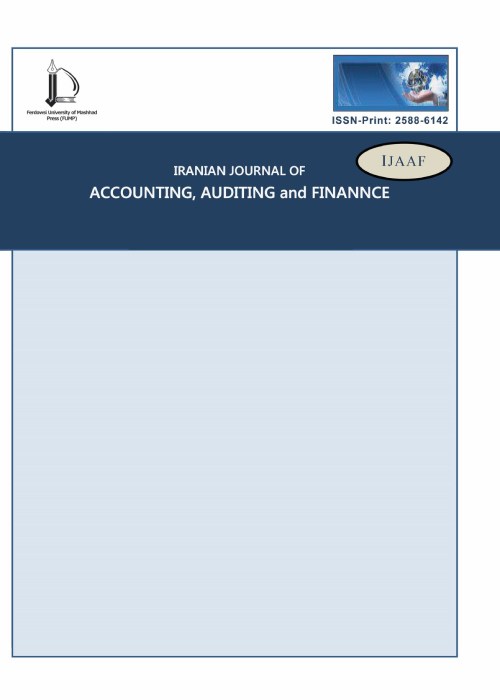فهرست مطالب
Iranian Journal of Accounting, Auditing and Finance
Volume:4 Issue: 4, Autumn 2020
- تاریخ انتشار: 1400/04/22
- تعداد عناوین: 7
-
-
Pages 1-14
This research aims to investigate the effect of corporate governance mechanisms on export performance. The statistical population includes 98 export companies listed on the Tehran Stock Exchange from 2010 to 2016. Data mining and statistical analysis are used to test the research hypotheses. This paper operationalizes the corporate governance mechanisms by the board of directors' independence, the concentration of ownership, and institutional investors. It further operationalizes export performance by export sales, export sales intensity, and the volume of export sales. The results show that ownership concentration has a significant effect on export sales. Furthermore, institutional investors have a significant effect on the volume of export sales. The current study may give great direction to companies exporting their products. In addition, the results also give researchers a path to focus on the current subject, especially in a developing country like Iran.
Keywords: Corporate governance, Export performance, Export sales, Export sales intensity, Export sales volumes -
Pages 15-29
This study aims to assess how management ability, political influence, and financial pressure affect Iranian banks' assets and liability management. To do this, the information of 11 active banks on the Tehran Stock Exchange is analyzed during 2009-2017. Three indices of liability to capital ratio, deposit to total assets ratio, and loans to total assets ratio are used for assessing the assets and liability management of banks. The results show that, first, management ability contributes to the liability to assets ratio. However, there is no significant relationship between management ability and deposit to assets ratio and loan to assets ratio. Second, political influence is inversely associated with the liability to capital ratio. This paper is the first study to assess such a topic in an emerging market. Thus, the results can provide useful insights for the financial analysts, shareholders, investors, government, and directors of banks in neighborhood countries.
Keywords: Management ability, Political influence, Financial pressure, Assets, liability management, Liability to capital ratio, Deposit to total assets ratio, Loans to total assets ratio -
Pages 31-43
The current study aims to assess the impact of the shareholders' participation in annual meetingson earnings management and financial restatement. Research hypotheses were examined using a sample of 768 firm-years observations on the Tehran Stock Exchange during 2012-2017. By using the multivariate regression model. The results show a negative and significant relationship between shareholders' partnership in annual meetings and both accrual and real earnings management. Moreover, the results indicate a positive and significant relationship between the shareholders' participation in annual meetings and financial restatement.
Keywords: Accrual-based earnings management, Financial restatement, Real earnings management, Shareholders participation in annual meetings -
Pages 45-56
This paper assesses how the board, CEO, and audit committee's characteristics influence internal control weakness. In order to test the hypotheses, data of listed companies on the Tehran Stock Exchange during 2012-2016 are collected. Panel data analyses indicate that managerial education level and audit committee independence inversely influence internal control weakness. However, there is no significant relationship between managers' or audit committees' other characteristics and internal control weakness.
Keywords: Internal Control Weaknesses, Board Characteristics, CEO Characteristics, Type of Audit Report -
Pages 57-70
The present study investigates the relationship between social responsibility and cash holdings. The sample contains 770 firm years listed on the Tehran Stock Exchange from 2011 to 2017. The software used for statistical analysis is Stata 12, and the hypotheses were tested according to the multivariable linear regression test. The results suggest a negative and significant relationship between social responsibility and cash holdings. Furthermore, the results indicate that corporate governance negatively affects cash holdings. In addition, the results show the relationship between unsystematic risk and cash holdings is positive.
Keywords: Social Responsibility, Cash Holdings, Unsystematic Risk, Governance Score -
Pages 71-82
This study investigates the effect of earnings and information quality on stock trading. The statistical population consists of 99 listed companies in Tehran Stock Exchange from 2013 to 2018. To test the hypotheses, multiple regression analysis of panel and pool data structure is used. The results show that the earnings persistence, earnings response coefficient, and accruals quality significantly affect the trading days’ ratio. Furthermore, it reveals an insignificant relationship between the annual stock return and trading days’ ratio. The results further reveal that the effect of earnings persistence and quality of accruals on stock trading turnover is similarly insignificant. Simultaneously, the earnings response coefficient and annual stock return significantly affect the stock trading turnover.
Keywords: Earnings Persistence, Earning Response Coefficient, Quality of Accruals, Stock Trading -
Pages 83-96
The development of E-banking plays an essential role in the performance of the economy. This paper examines whether and how the use of electronic devices affects banking transactions? To answer this question, this paper uses the Chakravorti model that estimated this relationship in the United States and employs the data of Iran’s banking system for ten banks — including Melli, Sepah, Saderat, Tejarat, Mellat, Refah, Saman, Parsian, Eghtesad Novin, and Pasargad — over 2009 to 2017. The results show that all three positively affect bank cards' volume of transactions among ATMs, POS terminals, and bank cards. In the meantime, the effectiveness of ATMs is more than sale terminal devices.
Keywords: E-Banking, Volume of Banks Transactions, Bank Card, ATM, POS, Number of Branches, Interest Rates of Facilities


